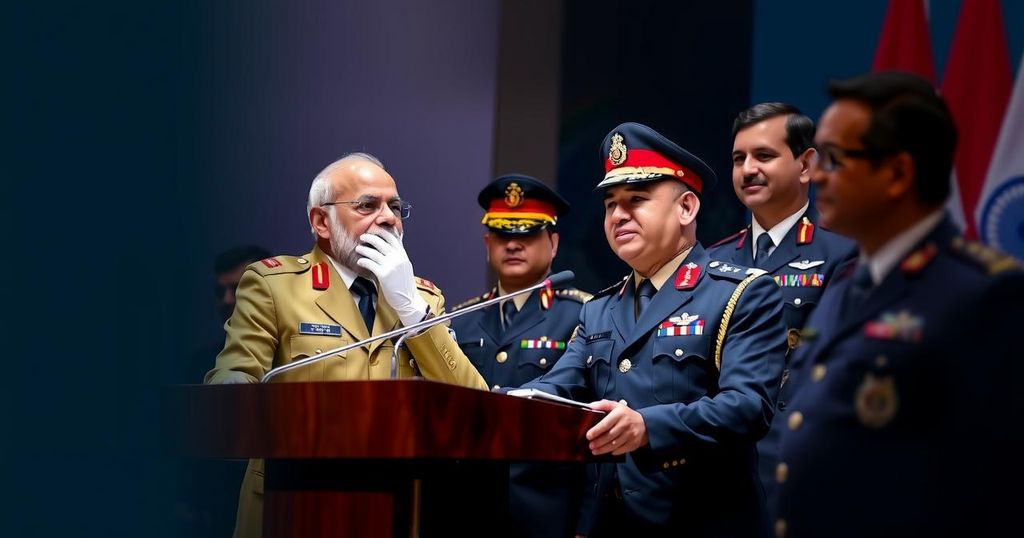COP29 concluded with India leading a revolt against a climate finance deal deemed inadequate for developing nations. India rejected the agreement, highlighting its insufficiency and the lack of trust in the negotiation process. This discontent was echoed by Nigeria and other developing countries, while developed nations celebrated the outcomes, characterizing them as a pivotal moment for climate finance. The discord underscores the ongoing struggle for equitable financial mechanisms in combating climate change.
The conclusion of COP29 was marked by significant discord as India spearheaded a revolt against a climate finance agreement which it deemed inadequate for developing nations. The Azerbaijan Presidency swiftly approved the deal amidst celebrations from developed countries, while India vocally rejected the resolution, stating it underscored a lack of trust and collaboration within the UNFCCC framework. India led a coalition of developing nations, signaling a robust pushback against what they considered an unreasonably low climate finance target, committed to improving resilience against climate change.
Chandni Raina, a negotiator from India, stated, “We are extremely disappointed. Trust is the basis for all action and this incident is indicative of a lack of trust.” She highlighted that the proposed climate finance goals of $300 billion annually by 2035 are insufficient to address the urgent needs of developing countries. Critically, Raina criticized key components of the proposal that risked further entrenching financial imbalances between developed and developing nations. Following India’s lead, Nigeria and other Like-Minded Developing Countries echoed their discontent, demonstrating a unified stand against the discrepancies in the financing mechanisms proposed.
Furthermore, environmental advocates lambasted the agreed-upon resolutions, asserting they lack ambition and fail to equip vulnerable nations with necessary resources to transition to sustainable energy systems. Harjeet Singh from the Fossil Fuel Non-Proliferation Treaty Initiative remarked, “The deal fails to provide the critical support required for developing countries to transition swiftly from fossil fuels to clean, renewable energy systems.” This sentiment was further echoed by various representatives from the Global South, who articulated their belief that this deal encroaches upon their ability to achieve climate goals.
Developed nations expressed optimism regarding the outcomes, with the EU asserting that COP29 would be remembered as a pivotal moment for climate finance. EU climate envoy Wopke Hoekstra characterized the agreed framework as ambitious, while UN Climate Change executive secretary Simon Stiell emphasized its importance as an insurance policy for humanity. However, the fundamental contention lies in the method of adoption and the inadequacies juxtaposed against the dire climate realities faced by developing nations.
In closing, the severe discontent expressed by India and its allies at COP29 illustrates a rift in the global climate finance discourse. The rejection of the climate finance deal underscores a critical impasse that points to an urgent need for more equitable financing mechanisms to support developing countries in their fight against climate change. This discord at COP29 thus potentially sets the stage for ongoing negotiations surrounding climate finance and accountability in future talks.
The 29th Conference of the Parties (COP29) was convened to address the pressing challenges of climate change, particularly through climate finance frameworks aimed at assisting developing nations, which often bear the brunt of climate impacts despite contributing negligibly to global emissions. The negotiations highlighted ongoing tensions between developed and developing countries, reflecting a long-standing debate over financial responsibilities and commitments. As climate emergencies escalate, the clarity and adequacy of financial support have come under intense scrutiny, particularly from nations in the Global South who often feel sidelined in negotiations that affect their future.
The events at COP29 illustrate a grave disconnect between the commitments made by developed nations and the realities faced by developing countries. India’s leadership in rejecting the climate finance deal emphasizes the urgent need for a reassessment of climate funding agreements to ensure they meet the actual needs of vulnerable nations. The call for fairer and more robust financial frameworks must resonate louder in future negotiations, as the stakes for climate action continue to rise globally.
Original Source: www.hindustantimes.com







